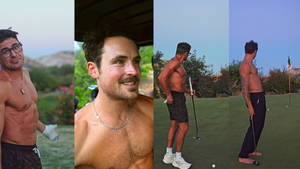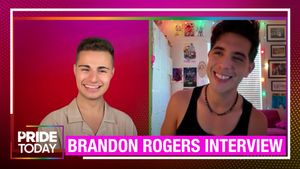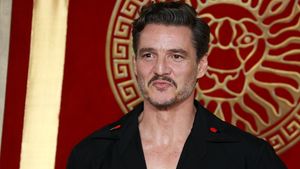I have spent my
entire life looking for the way out of pain.
However, no
matter what form it took--fear, depression,
bitterness, anxiety, jealousy, loneliness, addiction,
anger, judgment, self-criticism, you name
it--and no matter how much it hurt, for most of
my life I didn't think of it as pain. Rather I
qualified these feelings as symptoms of my
imperfection. In other words, I thought the pain was
me.
As an adolescent
growing up in the suburbs of Birmingham, Ala., in the
'70s and '80s, I was in a lot of pain. But by
the time I was 16, I was sick enough of being listless
and depressed to do something about it. I decided that
I wanted to be happy. And I was certain that the way to do
this was to correct my imperfections.
The most serious
of these imperfections was my homosexuality--it was my
fatal flaw, my original sin that I had not chosen to commit.
Though by my midteens I had accepted that this
condition was never going to change, I could not
really accept that I was gay. To me that would have meant
accepting that I was a lonely, pitiful and defective human
being, that I was not loved by God, that I was less
than straight men, that the only others like me were
shadowy discards from society. Doing that would have
meant accepting that I was never going to be happy, so that
was out of the question.
My sexual
attraction to men, however, was by no means the only
imperfection I needed to cloak. Compared to the fabulous
Pretty in Pink teens I grew up with, I was
absolutely riddled with imperfections--I
wasn't beautiful; I wasn't rich; I
wasn't masculine; I wasn't confident; I
wasn't athletic. As I became hyperaware of these
inadequacies, too, I slowly became both ashamed and
embarrassed to be me.
To remedy this I
became devoted to getting gorgeous and becoming
popular--in other words, to getting
"perfect." And college became the set
where I was able to successfully act the role of a
privileged pretty boy. Playing this role felt like the
very first shot of morphine after a lifetime of
debilitating pain, and I often felt high. But whenever the
morphine wore off, I would find myself hurtling back into
the void, and it was as if I had never left.
Meanwhile, my
sexuality was literally in the closet--that's
where I kept my gay porn, on a high shelf in a small
closet blocked off by a large chair. I even did such a
number on myself that, whenever I saw a guy I thought
was gay, I would find myself thinking, "Ugh, how
horrible that would be." Then I would
momentarily move into a kind of twilight zone of
awareness of the fact that I was this person I pitied. I was
in a state of shock over my own being.
Then in 1993 I
made a monumental shift in how I experienced my life when
I rebelled against the depression that still tormented me
and looked inside myself for the first time for its
source in the form of my own thoughts. Not only did
learning how to fight my thoughts mark the beginning
of the end of depression for me, it awoke a nascent
awareness of my power to change the reality of my life
by looking inward rather than outward. As a result,
the way I lived my life began to change.
First I ditched
my plans to go to law school and decided instead to
follow my lifelong dream to become a writer. Even more
significant, for the first time in my life I began to
question my belief that I couldn't come out of
the closet and be happy. There were few images of gay people
in the media then, so it was still a very lonely time to be
gay. And I couldn't even say the word
"gay" out loud, so I was at a total loss as to
how to go about coming out.
Then opportunity
struck. One night I read in Details magazine that
they were starting a new section that readers could
submit stories for. And I had a revelation: I would
write an essay about life inside the closet and thereby come
out in the process. As much as going through with it
scared me, and as much as it seemed an impossible long
shot that it would be selected, I became aware of a
silent, certain knowledge about what to do next: write that
essay. And so I did.
Despite my sense
of certainty, I was shocked when I got a call from an
editor in New York saying they loved the piece and wanted to
run it with a picture. At the time I was getting ready
to move from Mississippi, where I'd gone to
college, to Boston for my first magazine internship.
Added to the mix of my new life "up North" and
working in publishing would be the fact that I would
be Out. Me. Out of the closet. Gay and for everyone
else to see. I couldn't even imagine it.
The impact of
this article had a tectonic effect on my life, and the
result was miraculous. When the issue hit the stands I was,
in one swoop, out to the world. And quite unlike my
fears of rejection, I actually received a flood of
warm congratulations from friends and family. Then the
real shock came when dozens of young gay men from all over
the country began to write and call looking for
guidance. I myself was now a gay image in the media,
and a coming out mini-guru. It blew my mind.
Most miraculous
of all, though, were my feelings. I was the same person I
was the day before, only significantly truer to myself, and
it felt amazing. I was, to put it mildly, in a state
of bliss, reborn.
The big lesson
for me was that it had been my own ideas that I had to be
a different person from who I truly was in order to be happy
that had prevented me from experiencing the bliss of
authenticity. Growing up, my mom would regularly quote
William Shakespeare: "This above all, to thine
own self be true." Finally I understood what she, and
Shakespeare, meant.
It wasn't
for another year and a half after I'd moved to New
York City that I decided to become "gay"
in the cultural sense, because I was terrified to let
go of the "straight" Southern frat boy
sensibilities I had cultivated so carefully. The first
guy I slept with--a very
"straight-acting" guy I met on the
subway--only reinforced these notions, for he,
too, slept with men but wanted nothing to do with
"gay life" because he was a "real
man."
But when my
roommate, Dean, took me out to a legendary club in downtown
Manhattan called the Tunnel, and I popped an ecstasy and got
a load of gorgeous, glamorous gay men with hot bodies,
I changed my tune. I thought, If this is what being
gay is, I want to be it.
By the time I was
27 I felt I had arrived: I was a bartender at a famous
gay bar, scored a gig as a nightlife columnist for a gay
magazine, had become a known party boy in both
Manhattan and Miami Beach, and laid myself out in a
black-and-white spread for a Rizzoli book of homoerotic
nudes. And just like in college, I was high as a kite from
my successes. But it was an extremely fragile feeling,
and all it took was a guy not calling me back to then
have to spend weeks getting control of my thoughts
again in order to recover from depression.
It seemed no
matter how "perfect" I got, the void would
always get me in the end.
By the time I was
29, after four jam-packed years mastering gay life, I
was spent. As Etta James would sing in the blues bars in
Mississippi, the thrill was gone. And what it would
take to get the high back--harder drugs, riskier
sex, getting supersized by steroids--I wasn't
willing to do. I still longed to be happy, but that
route looked like an express train to the grave.
So I felt I had
no choice but to drop out of the scene. From that point I
lived in a state of withdrawal from all the morphine, in the
form of attention, I had become addicted to. Looking
for some kind of compensatory rush, I found myself
compulsively gorging on sexual conquests, and after
two years of that I found myself functionally
impotent. By that time the emptiness I felt had crept into
everything I did. I felt, in a word, bereft.
It began to dawn
on me that I knew a lot about being high, but not much
about being happy. I needed answers. I needed a way out. But
it was not easy to find. Gay culture continued to
advertise the dream of gay heaven--that the
right boyfriend, the right party, and the right sexual
conquest was the answer--but I'd wound up in
hell. And well-meaning gay friends and mentors
suggested that my real problem was that I was just
thinking about it all way, way, way too much.
Of course, the
problem wasn't that I was thinking too much.
It's that I was seeing more deeply.
Then one day I
was sitting out on my stoop on 21st Street in the heart of
gay Chelsea brooding over the tremendous sense of loss I was
living in when the wordless voice spoke up again, and
I knew to get up and go to the bookstore. I marched
two avenues over to the Barnes & Noble and walked
directly to a book I recognized as the one I needed to read
immediately.
It was the Dalai
Lama's Transforming the Mind. I picked it up
and read something that resonated through my being:
Not only does all suffering emanate from my thoughts,
but I have the power to change my thoughts.
And so I got to
work. Gay party boy became gay spiritual boy. At first it
was torture. I lived in a virtual isolation tank and became
an audience to the movies playing in my head, no
matter how painful they were. And with no one to
project the movies on and precious little to anesthetize
the pain they caused me, I discovered something profound.
I discovered that
I was the creator of my life, not a victim of it, and I
created in two ways--consciously in a state of
awareness, and unconsciously without awareness.
This helped me
discover the true nature of my emotional pain, which I
unconsciously created with my own thoughts. Being unaware of
this, I believed that the pain came from outside of me
or was an intrinsic part of me. Consciously I could
see what I had been doing and with the power this
knowledge gave me, I could stop using my own mind against
myself, ending the need for anesthesia to cover the
pain up or internal battles to fight it off. And as I
began to heal I discovered that an infinite abundance
of happiness existed inside me; all I had to do was to learn
how to want it, and how to receive it.
Though I was
putting all this newfound insight into practice, for a long
time I still felt empty and removed, and in a great deal of
conflict. It was as if I had one foot in my old life
but the other foot was still hanging in the air.
Then one misty
April Sunday evening after about a year and a half of
living in limbo like this, the other foot hit. I was walking
down 22nd Street between 5th and 6th avenues when I
was suddenly awash in something I can only describe as
extreme clarity and awareness.
I was then hit by
a tidal wave of bliss that was so consuming and brought
such tears and convulsions that I could barely walk (though
I held it together enough to cross the street to avoid
people, who surely would have called 911 had they seen
me up close).
Though at first I
didn't understand what was happening, slowly as I
made my way home I realized that I had become
connected to who I truly am, which is pure
consciousness. At that moment I was infused with the very
antidote to feeling bereft. That one moment of realization
was enough to change me forever.
What I have gone
through and continue to go through has been experienced
by many people throughout the ages. But what made bringing
my own path to light so challenging was the fact that
there was almost no mention of gay people or the gay
experience in any tradition I explored. This glaring
absence is mystifying to me, but there is no need to
investigate it. The same truth applies to everyone on
Earth, and the same light exists in every person.
But gay men, like
every other group, have a unique path tailored
especially for our growth. This book is intended to help you
see how your life as a gay man is, in fact, tailored
with perfect precision so that you, too, can discover
who you truly are. In that way, as my friend Thomas
says, being gay is a gift, and I wrote my book, The Way
Out, in part to help you realize it.
Coming out of the
closet is usually thought of as the singular answer to
the gay "predicament." As transformative as it
is, coming out is not enough, for there is now a gay
world ready to take over your mind and fill your head
with yet another "reality" about who you are.
All you have to do these days is become conscious
enough to realize you aren't straight, move
over into gay society, and then slip right back into
unconsciousness by letting gay society tell you who you are
and who you should be.
It's like
waking up from a coma in intensive care only long enough to
shuffle over to another unit where the bed is a better fit
and the pain medication is more intense and then going
right back to sleep.
And because of
this, like practically every other group on the planet,
gay men are having what the philosopher Joseph Campbell
called a "schizophrenic crack-up" from
aligning ourselves with gay culture's
programmatic life rather than listening to our own hearts.
And these days we
are being assaulted with programming from every
direction. Gay culture itself bombards its denizens with
views of ourselves at once outlandishly
self-aggrandizing and tragically self-destructive.
Mainstream popular culture, once virtually silent about
our existence, is now telling us we are genetically
programmed to be "fabulous," but please
don't have our gay sex or our gay love anywhere in
the open. And many of our political and religious leaders
are waging what they say they believe is a holy war to
keep gay people from receiving any sort of societal or
spiritual support and legitimacy.
Living at the
center of this tornado, every gay man is left to ask
himself, am I the coolest, trendiest, sexiest thing ever, or
an illegitimate cancer on society?
Which is it?
The answer is
that we are neither. In fact, we are not even gay. We are,
like everyone on the planet, spiritual beings on a physical
quest to realize our true nature. And the only way to
the realization of this truth is through the process
of letting go of everything you think you know, of
every limit you are sure exists, of every fear that has gone
unquestioned; for letting go is the only way to make room in
your mind for something new.
The book A
Course in Miracles points out that your perception
only allows in what it already believes to be true, so
if you are not willing to let go of your existing
beliefs, you have no chance of seeing that you, too,
are the sole creator of your life, and you have more power
than you could ever imagine.
Letting go
includes letting go of any ideas you might have about what
"spirituality" or
"consciousness" or "God" or even
"gay" means, because they are just
symbols on a map, nothing more. Don't get hung up on
them. And trust me, this something new that letting go
will reveal is utterly miraculous. The point
isn't just to accept or reject this, but to test it
out to see if it might be true for you too.
As anyone who
knows me will tell you, I am not perfect. As Candi Staton
sang so poignantly in the old disco classic,
"I'm a victim of the very song I
sing." However, like many others, I have been given a
message that I put into practice every day, and that I
am here, now, to pass on. And it is that, indeed, I am
perfect. And so are you. We are perfection itself . .
just not yet realized.













































































